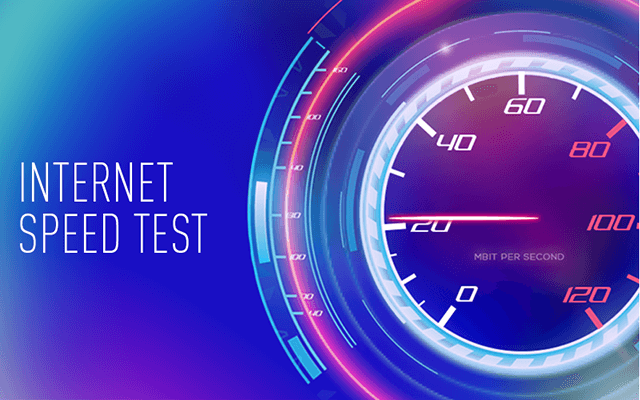More and more people are using internet speed tests these days. It’s a simple and useful way to check our internet connection. Have you heard about this tool and wanted to know how it works, what its results really mean, or what is a good test result? Here are some 7 of the most frequently asked questions (FAQs) about internet speed tests.
The Internet is an important part of our daily life activities
What’s a speed test?
An internet speed test (or speed test in short) check the connection speed of your connected device to the internet in real-time. The test measures 3 major values of ping (or also known as latency), download speed, and upload speed. And each of them represents specific qualities of the connection that will be interpreted much deeper in the next question.
What are ping, upload speed, and download speed?
- Ping: It’s a test measuring latency or how long it takes for a data packet to travel from a device to the test server. Ping is measured in milliseconds – ms. The higher the ping time, the longer it takes to transmit data. Or in other words, the lower the ping rate, the better your connection.
- Download speed: It measures how fast data can be transferred from a server to your device. Download speed is measured in megabits per second – Mbps. In internet speed test results, the higher the download speed, the faster your connection.
- Upload speed: It measures how quickly your internet connection can transfer your data or content to a server. Similar to download speed, upload speed is also measured in megabits per second – Mbps. The faster the upload speed, the better your connection.
>>> See more: How to find reliable speed test sites?
Is it normal for the download speed to be higher than the upload speed?
It is absolutely normal. In most internet speed test results, we often see a higher number of Mbps for download speed than the numbers for upload speed. Download speeds are important for loading websites, streaming music or videos, downloading files, and so on. On the other hand, upload speeds are vital for sending files, sending emails, making live video chats, etc.
In fact, the majority of online activities require more download bandwidth than upload bandwidth. In other words, most internet users spend a lot more time downloading than they do uploading, therefore, most Internet Service Providers (ISP) have designed their systems to give higher priority to downloading. Because of that reason, it is probably expected if your download speed appears to be faster than your upload speed.
Why should you run the test?
Running a speed test doesn’t take much time. It’s also convenient and easy to use, allowing us to keep track of the internet performance regularly so that we can notice unusual things happening to the network connection. The test results are a good source of information that lets us know if we are getting the speeds in our Internet plan or not.
Regular testing speed also helps you know what is causing the Wi-Fi signal strength or hardwired network connections to be weaker than usual. Based on the results of multiple tests, you will be aware of which high internet consumption devices are and isolate them if needed. Also, you can know whether there are unauthorized individuals or devices using your network.
It’s so easy to check your internet connection with a speed test
What factors may impact your test result?
There are several factors that have potential impacts on your test results. They include:
- Devices: Different devices such as PCs, smartphones, tablets, … have different cellular radio and different Wi-Fi capabilities. So, you may get different results when you run the test on different devices.
- The specific testing sites: Different testing sites have different servers that may perform differently. That’s why you should run a speed test using at least 3 different websites, then see the difference.
- Location of the test server: the nearer you are to a testing server, the higher your speeds may appear.
- Browsers: Different browsers like Chrome, Firefox, Safari, … come with different speed test capabilities.
Besides, the number of users, the number of devices connected to the network, and other factors also affect the test results.
How to get accurate speed test results?
As there are some different factors affecting the test results, you should follow some following advices to ensure the accuracy:
- Perform a test without any unnecessary programs or applications running on the device. The extra programs like online storage applications, automatic updates, or any others, could be using your internet connection while you are performing the test. This might cause an impact on the accuracy of the test.
- Your connection should not be under heavy use when you are performing the test. That means you need to make sure that there are no other devices using the network during the test.
- Perform multiple speed tests: It does not take much time to run a test, so you should perform a few tests at different testing sites to ensure the test results’ accuracy.
- Perform the test at different hours of the day: As internet speed can fluctuate during the day, you should test at different times of the day, at both non-peak and peak hours, and on different days as well.
Run a speed test to know how fast your internet connection is
What is the fast internet speed?
According to FCC, fast internet connection should have download speeds of at least 25Mbps and upload of at least 3Mbps since 2015. The speed of more than 25Mbps is considered so good for online activities like ultra HD video streaming, playing graphic-heavy games, downloading large files, and more. And a speed of 100Mbps and more is considered “high-speed internet”.
Conclusion
Here are 7 of the most frequently asked questions about internet speed tests and the answers. We hope that they are also the questions that you’ve got and the answers and information above are all useful to you. Don’t forget to look forward to many other upcoming articles from MySpeed.
Cre: speedtest.net, allconnect.com








0 Comments
Leave a Comment
Your email address will not be published. Required fields are marked *